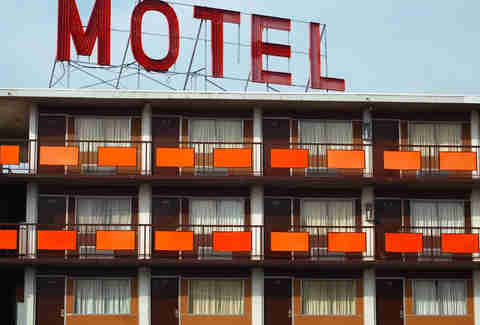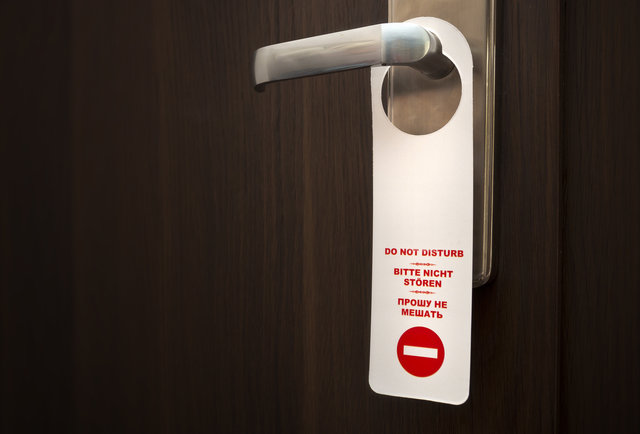How to Tell if Someone Died in Hotel Room
Travel
How to Tell if Someone Died in Your Hotel Room
How to Tell if Someone Died in Your Hotel Room
Maid Cleans Murder Chalk Outline in Hotel Room
Hotels don’t like to talk about it, but it’s not unheard-of for people check into hotels with the intention of permanently checking out. (of life, you see.)
Also lately I've been in rooms that reak of what smells like Crack Cocaine smoke. Crack cocaine is even more potent, less expensive and more widely available, making it a viable alternative to powder cocaine. Either some one smoked incessantly in the room proper or adjacent rooms. The stimulant can do you in or some one else in, if you or they have blood pressure management issues or are borderline hypertensive. AKA -- a silent killer, especially when it becomes full blown hypertensive. Your blood pressure and heart rate spikes. You won't be able to sleep, which makes matters worst. One can die of a stroke, heart attack or collapsed lung. As a result, I've changed rooms within a hotel and changed hotels proper, at least two or three times, to no avail. Invariably, I'm told they'll, always be some one smoking, next to you wherever you go, especially during Spring Brake.
Long after the body is gone, hotels go to great lengths to gently cover up the fact that someone died right there on the carpet/bed/balcony/toilet/mini-fridge. In high-profile cases, hotels may even go so far as to change room numbers -- see the Beverly Hilton after Whitney Houston’s death.
But sometimes you can sussh out what the hotel would prefer you didn't -- that someone died in your very room. We asked a guy who cleans up after the recently deceased. He dished not only on why so many people die in hotels, but how the mess gets cleaned up, and how you might be able to tell if your room was once a crime scene.
Why do so many people die in hotels?
“People don’t want to inflict the kind of damage a suicide does on their homes, so they go to hotels,” says Chris Vegors, who owns Crime Scene Cleaners Northwest in Seattle, and who for years was contracted by a large hotel chain to clean up, yep, its crime scenes. “A lot would also rather their family not find them. And it happens a lot more than you think.”
How much more? Hotels obviously aren’t ecstatic to advertise that information, and only one real study has been done on the frequency of hotel suicides. That study, done in Seattle in the early 2000s, found that locals who registered at Seattle-area hotels were about 20 times more likely to commit suicide than folks who were at home.
And though taking suicide statistics in Seattle and applying them to the whole country might sound a little like extrapolating skin cancer data from Hawaii, hotel deaths are certainly not exclusive to the dreary northwest.
What happens after someone dies in a room?
Once the police have CSI-ed the place, a crime scene cleaning crew comes in to assess the damage. Usually they throw away anything with a permeable surface: sheets, blankets, mattresses, wooden tables, lamp shades, or anything else that would get wet if you threw water at it. So don’t worry that you’re sleeping on a dead man’s mattress.
Most electronics also get tossed, since small amounts of blood and other matter can get into the devices’ crevasses, making them nothing you’d want to plug in and turn on. “You can’t let them heat up and start to stink,” Vegors says. “Hotels have stockpiles of the exact same stuff to replace it.”
Carpet gets ripped out too, as does any permeable linoleum or other flooring, carpet, headboards, artwork, also gone. Been in a room next to staff room in Travellodge Kissimmee FL where partial carpet was ripped up and a throw rug was placed over the spot. This after complaining about another room with you know signs. Pretty much all that’s left are the bathroom fixtures, the walls, the ceiling, and maybe some metal furniture. At which point everything gets sanitized and cleaned with solutions not available to the general public, like synthesized bovine enzymatic cleaner (the stuff they use to sanitize slaughterhouses) or industrial-strength hydrogen peroxide.
Once that’s done, someone has to sand down or fill holes in walls that may have caught a bullet or other debris. Wallpaper gets torn down and replaced, or the room is repainted.
“Everything has to basically look like new construction,” Vegors says. “If the cleaning is done right, you’ll probably never be able to tell if someone died in your hotel room. We do it right, but not everyone does.”
And if they don’t, they might leave behind these signs that your room played host to some foul play.
What are the signs someone might have died?
There’s an odd bump in the wall. Feel for an uneven surface where the wall was filled in and not sanded down properly. Of course, holes in the wall could be caused by a number of things -- a clumsy furniture installer, rowdy kids, The Who. A good rule of thumb is to look at the size of the bump. “If it’s smaller than a quarter,” Vegors says, “it’s probably a bullet hole.”
The room is only partially renovated. If you see, say, half the room with what appears to be fresh wallpaper, and another half with stuff that looks a little faded, chances are something happened in there that required only part of it to be taken down. But it’s not just wallpaper. “If half the room is done, and the bed and nightstands are completely new, but the kitchenette and bathroom are older-looking stuff, that means cleaners went in, did something in the living area, and didn’t do the turn on the rest of the hotel room,” Vegors says.
The A/C unit smells awful. If you’re in a hotel room with a wall A/C unit, Vegors says it’s the most commonly missed item by crime scene cleaners, and often has human remains stuck in the vents after a death. The blood and other matter seeps through the vents and into the wiring, and the air blowing out of it will smell like decomposing flesh. Most guests are likely to mistake it for garbage, and write it off as “stinky A/C” in a two-star TripAdvisor review. But not many things can make a wall unit smell that bad.
There are flies in the light fixtures. “I take all the fixtures down and either toss them or sanitize them,” says Vegors. “But not everyone thinks that thoroughly. So if you look up at those, that’s where you’ll see some interesting shit.” People who kill themselves may be in a room for a few days after they die, especially in longer-stay hotels where they’ve pre-paid. Flies begin to infest the room and crawl up in the light fixtures, either getting stuck there or leaving waste behind. This isn’t likely to happen in nicer hotels, but if you’re in the kind of place where light fixtures aren’t regularly cleaned, dead flies could be a tipoff.
The ceiling is noticeably different than the rest of the hotel. Ideally, a crime scene cleaner can scrape whatever needs to be scraped off the ceiling, sanitize the ceiling, and fill it in to look new. Since imperfections aren’t as easily noticed on the ceiling as a wall, it’s typically an easier fix. But if you look up and see a janky ceiling, it can a sign of a particularly nasty death.
Of course, none of these things definitively mean someone expired in your room. A family of chain smokers could have fumigated the place. Or the hotel might have been due for an overhaul anyway. Or the ceiling had a bad leak. But since death in hotel rooms isn’t completely unusual, it’s worth it to scan for the signs. Because the hotel sure isn’t going to tell you.
Sometimes, they sell out to a land developer that turns it into a mall, especially if it's a highly publicized, murder.
Author, who's seriously reconsidering every hotel he ever stayed in with a wall unit A/C.
Sometimes, they sell out to a land developer that turns it into a mall, especially if it's a highly publicized, murder.
Author, who's seriously reconsidering every hotel he ever stayed in with a wall unit A/C.
Speaking of Cocaine Use...
Frequent cocaine use can cause many negative physical effects, including death.
It can affect many parts of the body, including the heart. According to the American Heart Association, cocaine use causes 15,000 deaths every year in the United States. Many more deaths are caused by cocaine’s damage to the heart.
How Cocaine Affects the Heart
Because cocaine acts as a stimulant, it pumps adrenaline through the body, similar to how the body would react in a frightening situation. The adrenaline causes an increase in heart rate and blood pressure. According to eMedicineHealth, these changes cause chest pain.
Chest pain is fairly common among cocaine users and accounts for 40 percent of emergency room visits by cocaine users, making it the most common reason behind visits.
There are other common cardiovascular problems that cocaine users often experience. Rapid heart rate and abnormal rhythms are also common.
Uses may also experience disease of the heart muscle, which is called cardiomyopathy. This leads to enlarged heart ventricles. When the walls of the aorta weaken, they can dissect or rupture. Even sporadic use of cocaine can cause arteries to narrow and blood flow to decrease, which can lead to chest pain, also known as angina. This can be the onset of a heart attack. According to eMedicineHealth, these types of cardiovascular problems have been commonly found in cocaine users between 19 and 44 years of age.
The stimulation of the heart caused by cocaine use can also lead to abnormal heart rhythms, which are known as ventricular fibrillation and ventricular tachycardia. More than 20 percent of emergency room visits by cocaine users are for heart arrhythmias or palpitations.
According to the American Heart Association, cocaine can cause other negative effects on the heart, including myocarditis, which is an inflamed heart muscle. The inner lining of the heart can also become inflamed and cause endocarditis. A cocaine user can also develop pulmonary edema, or fluid in the lungs. Blood vessels in the heart can develop blood clots and result in vascular thrombosis.
Cocaine Use Increasing
Cocaine use is expected to gain popularity. Not only can it be obtained fairly easily in some areas, but it can be administered various ways. It does not need to be injected, so those who are scared of needles can snort or smoke the drug to achieve a high. Crack cocaine is even more potent, less expensive and more widely available, making it a viable alternative to powder cocaine. However, its potency makes heart problems even more common. Young people and those who are otherwise healthy could suffer from heart attacks and strokes from frequent use of crack cocaine. Even first-time users are at risk.
Risk Factors for Heart Problems
Cocaine can cause heart problems for anyone who uses the drug. However, certain types of people are more susceptible to them. According to the American Heart Association, they include the following:
- First-time users
- Older users with coronary arteries that are clogged or abnormal
- Pregnant women
- Those who smoke crack cocaine
Get Treatment for Cocaine Addiction
Cocaine use can be deadly. In fact, thousands of cocaine users die every year. Don’t become a statistic. Help is just a phone call away. We can help you find the right treatment facility for your needs. There are many options to choose from.
Psst don't tell anyone...
https://chemm.nlm.nih.gov/phosgene_hospital_mmg.htm
Psst don't tell anyone...
https://chemm.nlm.nih.gov/phosgene_hospital_mmg.htm






Comments
Post a Comment